'I set about writing wanting to give you something I love'
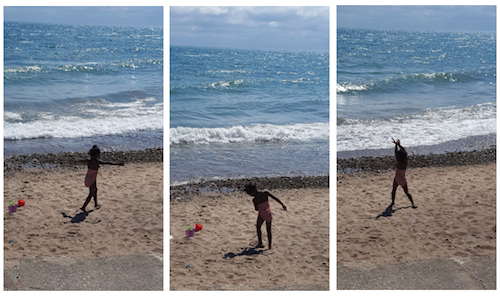
Music, I decide, and choose a favorite playlist. ♪ It’s my pre-show audio, a compilation of disco tunes I like to blast over the theater’s main sound system in the hour of prep before the house opens for Thingification, my one-woman show. It’s a go-to selection of yesteryear’s dance gems guaranteed to hype me up for the performance and transform the energy of the space, infusing it with welcome and well-being.
We start with Dr. Buzzard’s Original Savannah Band—a name I just like saying, assonance and alliteration, A’s and N’s bookended by D’s and the length of it, like the music for me—a cinematic glamour, transporting me to another place and time, Big Band meets Blues meets Afro-cuban funk, R&B lifted on “swinging horns” and “swirling violins” for a smooth cosmopolitan groove. I sing along and dance, “Ramba, Cherchez la femme / C’est si bon, c’est si bon, c’est si bon.” Vibes, violins, horns. “For misery, my friend, cherchez la femme.”
Alongside my body’s “interpretive moves,” my mind circles juxtaposing lyric and performance, indirection’s seductive, playful energy: “All I can say/ Of one thing I am certain / they’re all the same/ all the sluts and the saints/ For misery, my friend/ cherchez la femme.”
Ha! I laugh registering the logic behind my mind’s quick connection between this old school cut and Machine’s 1979 single “There But for the Grace of God Go I”: The trajectory of “Voice of America,” a collage of sound and thought I published in Drag. It begins “someplace far away” in Peckerwood Creek, AL with Machine’s pristine lyric critique of exclusion “no blacks no Jews and no gays” and ends refusing the “old music” of the scapegoat highlighted by the French saying.
The old music, oppressions linked lockstep, working for death lock, stock, and barrel. I clear more space to dip and spin, choosing joy.
After hours dancing, wearing out the proverbial groove in the record, I write quickly in big print script (big for me): Why I dance instead of writing, shirking dutiful daughter and one love for another:
Because I am not dead
Because mourning, my ambiguous grief, does not press
Because I am here: I do not watch my face, my hands moving from a
point just ahead or to the right, just above
Because the heat has abated some and the fans are blowing cool,
oscillating and drum solos drive my wild arms like careless sticks
and mallets, invisible traps, cowbells I bounce, snare to rim
Because the large bones of my spine are not fused together, neither
the sacrum, nor bony fusion in my ribs and I do not have to hold
my breath this moment, the chasing—a dream—the slick blood, when
I awoke, shrank back and no cinder block bombs wedged open my
jaw, my teeth were not broken, no shrapnel raw muscle, no stiff
fear, red word, rage vest anchor
Because my skull smooth and continuous
Because, dreadlocs gone and hair cornrowed, I look like a little boy,
I laugh at my peanut head, my woman hips tilting I dance
Because there’s a music in me for me and they who want me
naught are not now no SWAT, no cold cock, no good high five
over me biting bullets’ dust, no mollly manchild lurch cuss
spew and string
I want no one, nothing dead this moment
Because my pelvis, my lumbar spine, my ankles, wrists, bows,
tendons and connective tissues we stretch, move an oily
pretend and I squeeze my face together like I am four and
serious in my orthopedic shoes’ hard leather bottoms,
my favorite pair navy blue blue, deep blue, I skip and
jump, my blue I slide
***

In a newly initiated poetics project, I am inviting poets and artists to participate in my creative-critical arts practice by attending to the Call & Response Performance Ensemble’s prompt to conduct Experiments in Joy (first announced at Antioch College in 2014). Folk are invited to share reflections and creative works towards shared joy and our collaborative creation of the worlds we inhabit—and the worlds that inhabit us. These are some of the responses.
Lady Africa: The Joy Is You
YC Harvey
Pittsburgh, PA
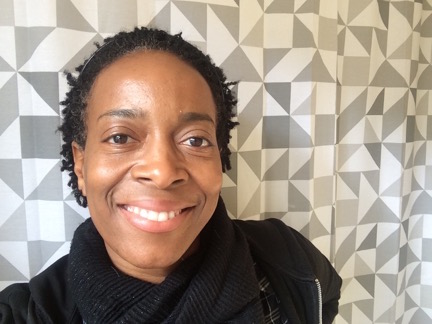
1. Tell the truth
Sometimes before a poetry reading, I’ll apologize: “I don’t have many happy poems. There’s a little Wednesday Adams in my chest.”
From a very young age, I’ve often seen the cracks in things. The school curriculum. The Bible. The “rules” for “us” versus “them.”
But it’s more true that I experience joy on the regular—proud mother of two and friend to many a fierce woman, how could I not? My trouble is in the expression of joy. And this predicament feels odd because joy is such a powerful feeling. My friend, fiction writer Angie Cruz knows this. She lives in joy—like Ntozake Shange lives in music.
2. Make something new (and further truth telling)
I'm writing a poem for my BFF Erika’s husband, Joseck. Joseck = ½ of a couple I adore. I admire the full expression of their lives and love for one another—experienced in their teasing (you have to feel secure to tease), their delectable dishes (they compete over who has prepared the best meal for you (who does that?!)), the music they've given me to take on the road, and, most recently, their son, Ahadi. They are also excellent storytellers. “Give me the old college stories about Erika,” Joseck has been known to tell hopelessly, tightlipped me.
3. Invite someone in
In this case, Joseck invited me to write the poem for a new song, “Lady Africa.” Joseck is one of fourteen children born in Nairobi, Kenya to a musically gifted family. His band is Jabali Afrika. He is one of the most joyous people I know.
Joseck says:
I guess we are always joyful because we come from a place where we rejoice even in times of sorrow. Everything is in a song melody or dance. However sad or happy. And I have seen the same attitudes especially with the black [communities]; it is in the DNA.
4. Document
See above and below. It’s ongoing, friends.
5. Repeat
Joseck sent me the musical track before a recent trip and I was bouncing around the airport like an animated character. I’ve listened to it nonstop to get the wordplay “right.”
***
Showing up to joy
Tamiko Beyer
Lower Mills, Dorchester, MA, U.S.A.
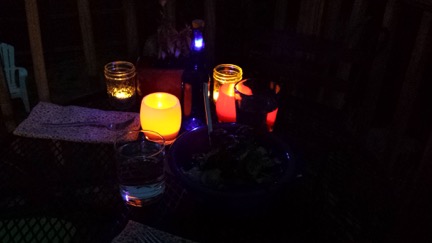
It is difficult to conduct an experiment in joy as police shoot and kill two more black men within days of each other. To hold on to joy as the seams of society fray feels foolhardy, even offensive.
But I do it. The week of July 4th and the days that follow, I look for joy in the midst of rage and sadness. I find it in the present moment, in community, in poetry.
I appreciate the construct of the experiment. How it leaves the door wide open to possibility. And, at the same time, how the rules give structure to possibility, order to chaotic randomness. It turns out to be exactly right for the moment.
At the end of June, as I set out to conduct the experiment, I am not sure what to expect. I say “yes,” because how can you say no to joy?
But the world is a hard and terrible place
On July 3, I invite people from different parts of my life to participate in this experiment in joy. My mother, my girlfriend, a coworker, and an old friend say yes. They will be awake to joy in the week that follows and will send me something–a phrase, a photo, a link to their joy.
I plan to take their joys and make something new. A poem. And to stay awake to joy in my own life, and weave that into the poem, too.
On July 5, Alton Sterling is murdered by the Baton Rogue police. On July 7, in St. Paul, Philando Castile is shot, with his girlfriend and baby in the car with him. The days that follow are filled with more violence and chaos in the U.S. and around the world. Dallas, Cleveland, Turkey, Germany, France, Iraq….
The world feels frightening, unstable. But I know that injustice, racism, violence, and dehumanization are nothing new. It all feels like a particularly vivid manifestation of centuries of horrors and injustices that systemic racism, capitalism, and imperialism have heaped upon people here in the U.S. and around the world.
I recognize I have grown too comfortable in my middle-class life in the U.S., in my queer and able body, in my light skin. I open up to anger.
The heart of determination
On the Wednesday after the deaths of Sterling and Castile, I attend a gathering of APIs for Black Lives. In that room full of Asian American and Asian folks of all different backgrounds determined to be part of creating systemic change, I felt something fill my being.
It isn’t joy, but it is light. It feels like moving forward. In that room, we create something both new and old at the same time: community, solidarity, action.
New, because that particular group of 100 people had never come together before in that particular formation. Old, because Asian American solidarity with black liberation movements goes back for decades, if not more.
And new again, because this is a time like no other. I dare to hope that we are, in June Jordan’s words, the ones we’ve been waiting for. We are the ones that must succeed in changing the system soon, in dismantling systemic racism, in creating a world where black lives do matter.
With all of it, I [write] a poem
At the end of the week, the people in my life send me words, phrases, passages, lists, photos, and links. I hold what brought them joy. Some of them also tell me that joy was hard to come by that week. I hold that, too.
I write a poem with words that came from them, and from an email one of the organizers of the API for Black Lives matter movement sent out a few days after the meeting. The poem contains only their words.
I write into their joy toward my joy. I arrange the words towards a truth I hope we can discover. A truth I think we need to discover to create a world where a life seeped in joy is a birthright and reality for all people.
As I write, I remember how poetry requires me to be in the present moment. How language can construct a reality and be an invitation to step into that reality. I remember that there is only the now, and this is where change begins.
No short cut to social justice
In the end, I see this experiment in joy as a small part of my social justice work. Not the poem itself, on its own. But the process. My documentation of it. I see great potential in many of today’s poets and poetics that insist on integrating our art into the current political context.
There's no easy way to create change. I know this. It requires I show up every day. And do the work every day. And hold the fucked-up nature of the world every day and resist the urge to step back. And figure out the next step, and the next, and the next step. And be awake and kind, and hold love. There's a particular energy in that, an expansion close to joy.
***
of blk art amongst whiteness. & white obsession with blk body(count) & hymn(s)
a work of consciousness
avery r. young
Chicago, IL
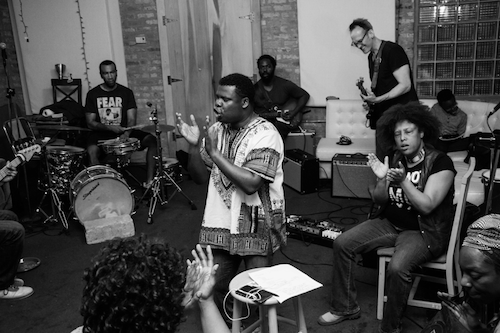
she saw me with deacon board back in April. she asked a professor if she knew me. the professor did & now she & i be two blk folk in a coffee house. we hug. we take deep breaths. she smelling of amber. & i of sandlewood. we exhale. sit. we be within a week of hashtags in front of names of cullud men who have been made ghosts at the hands of white men with badges. with tears she thanks me for metting with her, but wants to know why they want us dead? i answer they don't want us anything. & unfortunately, dead is a quick & convenient way for us to become the nothing they would rather deal with.
she doesn't wipe her face. you & de deacon board were church. a church i really needed. i wasn't ready. & i was so bothered a couple of days after your show. it was beautiful but i was bothered that white muddafukkas were there. i watched you serve us to them with no fear. you served us to them with joy & love …
but you ain't let them off the hook. you told them to clap. you told them that they better sing & i kept asking why are they here? this ain't theirs. this is ours. & he giving it to them. & they in it. & i was furious. i was mad that i didn't stop the show & sweep the blk folk into a secret space where we could just enjoy the church. she smlies. face still wet. she wants to know ever feel like you are sharing our business with the white folk in the audience?
my face twists our business? we ain’t secret to them. well, i ain't trying to be one. my life a bold one so the art manufactured during it gotta be bold too. & them niggas bold. the stunts they pull become our business. as many of them who snatch us up & then show up LATE to the party in our clothes - chile please. i was born to remind anybody what authenticity look like.
look. the audience for Jesus’ sermon on the mountain included his disciples, admirers & haters. & he ain't withhold fish nor bread from anybody. whosoever cometh gonna get it blk!.
she bears witness. & you really don't care who you do that in front of. it's beautiful. i was just so mad cause i want to be able to church like that ...
i interject & eat watermelon in front of them.
she says exactly.
speak that into me.
& in wicker park. we still be blk folk. we stand. we hug. i place my hands over hers ... consider it spoken.. & we leave the coffee house. she now smelling a lil bit more like sandlewood. & i smelling a bit more like amber.
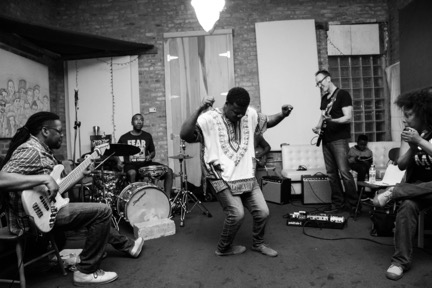
***
♪DrPoMo’s Doin’ It to Death Disco Dancin’ Dozen
aka Mistress C’s Birthday Party Memento, a Thingification Compilation
The Harri Blogject’s Experiments in Joy Playlist #1
1. Cherchez La Femme / Se Si Bon (1976)—Dr. Buzzard's Original
Savannah Band
2. Reach Your Peak (1979) —Sister Sledge
3. Pleasure Principle (1978—Parlet
4. 100% Pure Love (1994)—Crystal Waters
5. The Spirit's In It (1981)—Patti LaBelle
6. Think (About It) (1972) —Lyn Collins (The Female Preacher)
7. I Know You, I Live You (1981) —Chaka Khan
8. Do You Wanna Get Funky With Me (1977)—Peter Brown
9. I Need You (1980) —Sylvester
10. Funkin' For Jamaica (1980)—Tom Browne
11. Got To Be Real (1978)—Cheryl Lynn
12. Searching (1980) —Luther Vandross with Change
Duriel E. Harris is a poet, performer, and sound artist. She is author of the poetry collections No ...
Read Full Biography

